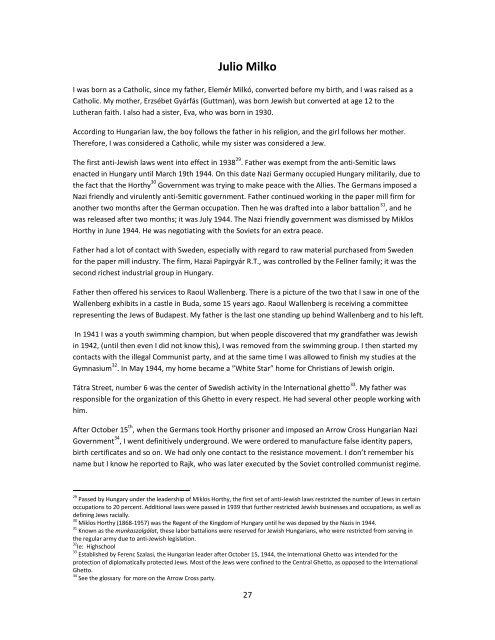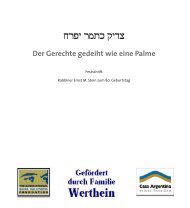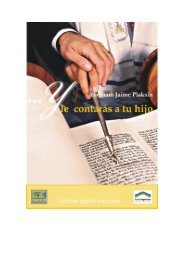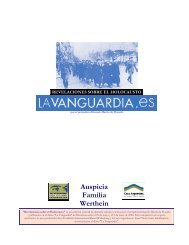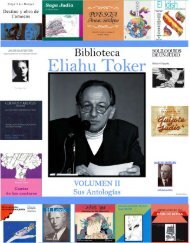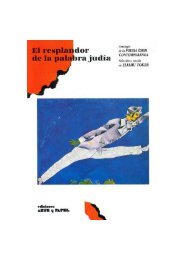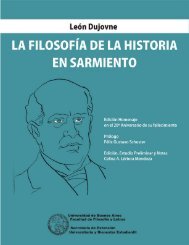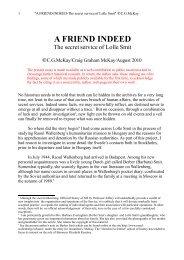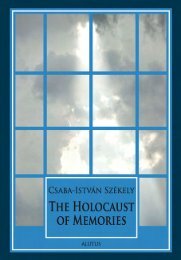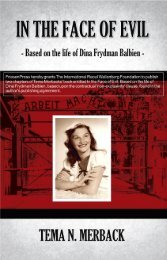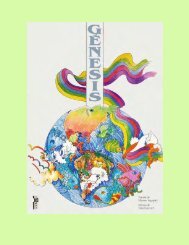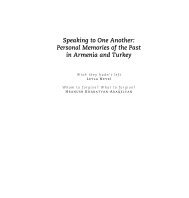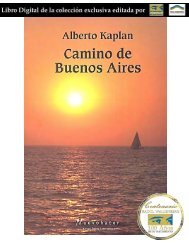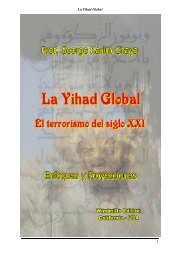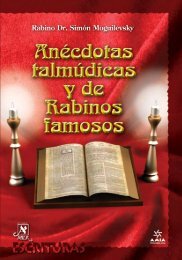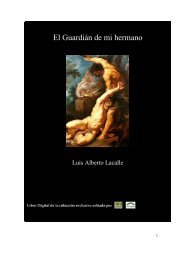We were There - The International Raoul Wallenberg Foundation
We were There - The International Raoul Wallenberg Foundation
We were There - The International Raoul Wallenberg Foundation
Create successful ePaper yourself
Turn your PDF publications into a flip-book with our unique Google optimized e-Paper software.
Julio Milko<br />
I was born as a Catholic, since my father, Elemér Milkó, converted before my birth, and I was raised as a<br />
Catholic. My mother, Erzsébet Gyárfás (Guttman), was born Jewish but converted at age 12 to the<br />
Lutheran faith. I also had a sister, Eva, who was born in 1930.<br />
According to Hungarian law, the boy follows the father in his religion, and the girl follows her mother.<br />
<strong><strong>The</strong>re</strong>fore, I was considered a Catholic, while my sister was considered a Jew.<br />
<strong>The</strong> first anti-Jewish laws went into effect in 1938 29 . Father was exempt from the anti-Semitic laws<br />
enacted in Hungary until March 19th 1944. On this date Nazi Germany occupied Hungary militarily, due to<br />
the fact that the Horthy 30 Government was trying to make peace with the Allies. <strong>The</strong> Germans imposed a<br />
Nazi friendly and virulently anti-Semitic government. Father continued working in the paper mill firm for<br />
another two months after the German occupation. <strong>The</strong>n he was drafted into a labor battalion 31 , and he<br />
was released after two months; it was July 1944. <strong>The</strong> Nazi friendly government was dismissed by Miklos<br />
Horthy in June 1944. He was negotiating with the Soviets for an extra peace.<br />
Father had a lot of contact with Sweden, especially with regard to raw material purchased from Sweden<br />
for the paper mill industry. <strong>The</strong> firm, Hazai Papirgyár R.T., was controlled by the Fellner family; it was the<br />
second richest industrial group in Hungary.<br />
Father then offered his services to <strong>Raoul</strong> <strong>Wallenberg</strong>. <strong><strong>The</strong>re</strong> is a picture of the two that I saw in one of the<br />
<strong>Wallenberg</strong> exhibits in a castle in Buda, some 15 years ago. <strong>Raoul</strong> <strong>Wallenberg</strong> is receiving a committee<br />
representing the Jews of Budapest. My father is the last one standing up behind <strong>Wallenberg</strong> and to his left.<br />
In 1941 I was a youth swimming champion, but when people discovered that my grandfather was Jewish<br />
in 1942, (until then even I did not know this), I was removed from the swimming group. I then started my<br />
contacts with the illegal Communist party, and at the same time I was allowed to finish my studies at the<br />
Gymnasium 32 . In May 1944, my home became a ”White Star” home for Christians of Jewish origin.<br />
Tátra Street, number 6 was the center of Swedish activity in the <strong>International</strong> ghetto 33 . My father was<br />
responsible for the organization of this Ghetto in every respect. He had several other people working with<br />
him.<br />
After October 15 th , when the Germans took Horthy prisoner and imposed an Arrow Cross Hungarian Nazi<br />
Government 34 , I went definitively underground. <strong>We</strong> <strong>were</strong> ordered to manufacture false identity papers,<br />
birth certificates and so on. <strong>We</strong> had only one contact to the resistance movement. I don’t remember his<br />
name but I know he reported to Rajk, who was later executed by the Soviet controlled communist regime.<br />
29<br />
Passed by Hungary under the leadership of Miklos Horthy, the first set of anti-Jewish laws restricted the number of Jews in certain<br />
occupations to 20 percent. Additional laws <strong>were</strong> passed in 1939 that further restricted Jewish businesses and occupations, as well as<br />
defining Jews racially.<br />
30<br />
Miklos Horthy (1868-1957) was the Regent of the Kingdom of Hungary until he was deposed by the Nazis in 1944.<br />
31<br />
Known as the munkaszolgálat, these labor battalions <strong>were</strong> reserved for Jewish Hungarians, who <strong>were</strong> restricted from serving in<br />
the regular army due to anti-Jewish legislation.<br />
32<br />
Ie: Highschool<br />
33<br />
Established by Ferenc Szalasi, the Hungarian leader after October 15, 1944, the <strong>International</strong> Ghetto was intended for the<br />
protection of diplomatically protected Jews. Most of the Jews <strong>were</strong> confined to the Central Ghetto, as opposed to the <strong>International</strong><br />
Ghetto.<br />
34<br />
See the glossary for more on the Arrow Cross party.<br />
27


